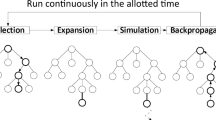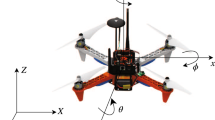Abstract
The main issue in multi-agent planning (MAP) is the agents’ coordination process that is a computationally hard problem. Thus, many works focus on the planning strategy considering the computational process, agents’ distribution roles, information privacy, and the resources coupling level. But domain-independent models that explore the balance between coordination process and privacy leading to efficient execution are missing. In this manuscript, we present a Lightweight Coordination Multi-agent Planning (LCMAP), a domain-independent model that balances the coordination process and privacy through three independent phases: (i) verification—each agent verifies its capabilities of reaching the goals; (ii) transformation—the coordinator selects agents through their capabilities and distributes the goals, transforming the original problem into single-agent problems; and (iii) validation—each plan is validated to check whether it can be parallel. LCMAP was compared to the state-of-the-art models to evaluate time efficiency and plan length during the problem-solving process using loosely and tightly coupled domains with specific evaluation metrics inherited from planning competitions. Furthermore, we conducted experiments to evaluate the execution efficiency regarding different configurations concerning planning time and plan length of the models, when LCMAP execution proves to be efficient.






Similar content being viewed by others
Notes
Pre-planning tries to guarantee that the agents’ plans can be combined into a solution that satisfies the goals of the MAP task [44].
IPC is a biennial event organized in the International Conference on Planning and Scheduling with objectives such as to provide a forum for an empirical comparison of planning systems. (http://www.plg.inf.uc3m.es/ipc2011-deterministic/).
\(\overline{metric}\) describe the arithmetic mean of the values of the model considering all the experiments.
References
PDDL Resources - IPC - 2008 (2016) Available at http://icaps-conference.org/ipc2008/deterministic/PddlResources.html
Baldoni M, Baroglio C, Micalizio R (2015) Social continual planning in open multiagent systems: a first study. In: PRIMA, pp 575–584
Borrajo D (2013) Multi-agent planning by plan reuse. In: International conference on autonomous agents and multiagent systems (AAMAS), IFAAMAS, pp 1141–1142
Borrajo D, Fernández S (2015) MAPR and CMAP. In: Competition of distributed and multi-agent planners (CoDMAP 2015), pp 1–3
Borrajo D, Fernández S (2019) Efficient approaches for multi-agent planning. Knowl Inf Syst 58(2):425–479
Brafman R (2015) A privacy preserving algorithm for multi-agent planning and search. In: Proceedings of the 24th international conference on artificial intelligence. AAAI Press, pp 1530–1536
Cardoso R, Bordini R (2016) Allocating social goals using the contract net protocol in online multi-agent planning. In: Proceedings of the 5th Brazilian conference on intelligent systems (BRACIS), IEEE, pp 199–204
Chouhan SS, Niyogi R (2016) Multi-agent planning with quantitative capability. In: International conference on advances in computing, communications and informatics (ICACCI), IEEE, pp 602–606
Chouhan SS, Niyogi R (2017) MAPJA: multi-agent planning with joint actions. Appl Intell 47(4):1044–1058
Chouhan SS, Singh A, Niyogi R (2015) Multi-agent planning with joint actions. In: 2015 International conference on advances in computing, communications and informatics (ICACCI), IEEE, pp 1284–1290
Cooper ID (2016) What is a mapping study? J Med Libr Assoc 104(1):76
Crosby M, Jonsson A, Rovatsos M (2014) A single-agent approach to multiagent planning. In: Proceedings of the 22nd European conference on artificial intelligence (ECAI), pp 237–242
Dukeman A (2017) Hybrid mission planning with coalition formation. Ph.D. Thesis, Vanderbilt University
Elkawkagy M, Biundo S (2011) Hybrid multi-agent planning. In: Multiagent system technologies, pp 16–28
Ferrando SP, Onaindia E (2012) Defeasible argumentation for multi-agent planning in ambient intelligence applications. In: 11th international conference on autonomous agents and multiagent systems (AAMAS), IFAAMAS, pp 509–516
FiS̆er D, S̆tolba M (2015). MAPlan. In: Competition of distributed and multi-agent planners (CoDMAP 2015), pp 8–10
Ghallab M, Nau D, Traverso P (2016) Automated planning: theory and practice. Cambridge University Press
Gordon G, Varakantham P, Yeoh W, Lau HC, Aravamudhan A, Cheng S-F (2012) Lagrangian relaxation for large-scale multi-agent planning. In: International joint conferences on web intelligence and intelligent agent technology, IEEE Computer Society, vol 2, pp 494–501
Guzman C, Castejon P, Onaindia E, Frank J (2014) Robust plan execution in multi-agent environments. In: 26th international conference on tools with artificial intelligence (ICTAI), IEEE, pp 384–391
Hadad M, Kraus S, Hartman IB-A, Rosenfeld A (2013) Group planning with time constraints. Math Artif Intell 69(3):243–291
Hoffmann J, Nebel B (2001) The FF planning system: fast plan generation through heuristic search. J Artif Intell Res 14:253–302
Jonsson A, Rovatsos M (2011) Scaling up multiagent planning: a best-response approach. In: International conference on automated planning and scheduling (ICAPS)
Kitchenham B, Budgen D, Brereton P (2010) The value of mapping studies-a participant-observer case study. In: EASE, vol 10, pp 25–33
Klöpper B, Honiden S, Dangelmaier W (2011) Divide & conquer in planning for self-optimizing mechatronic systems-a first application example. In: Symposium on computational intelligence in control and automation (CICA), IEEE, pp 108–115
Luis N, Borrajo D (2014) Plan merging by reuse for multi-agent planning. In: 2nd ICAPS workshop on distributed and multi-agent planning (DMAP’14), pp 38–44
Maliah S, Brafman R, Shani G (2017) Increased privacy with reduced communication in multi-agent planning. In: International conference on automated planning and scheduling (ICAPS)
Maliah S, Shani G, Stern R (2016) Stronger privacy preserving projections for multi-agent planning. In: Proceedings of the 26th international conference on international conference on automated planning and scheduling. AAAI Press, pp 221–229
Moreira LH, Ralha CG (2016) Transforming multi-agent planning into single-agent planning using best-cost strategy. In: Brazilian conference on intelligent systems (BRACIS), IEEE, pp 462–467
Moreira LH, Ralha CG (2017) Improving multi-agent planning with unsolvability and independent plan detection. In: Brazilian conference on intelligent systems (BRACIS), IEEE, pp 103–108
Nath A, Niyogi R (2015a) An extension of FMAP for joint actions. In 8th international conference on contemporary computing (IC3), IEEE, pp 487–492
Nath A, Niyogi R (2015b) Validation and verification of joint-actions in multi-agent planning. In: International conference on information technology (ICIT), IEEE, pp 187–192
Nissim R, Brafman R (2012) Multi-agent A* for parallel and distributed systems. In: Proceedings of the 11th international conference on autonomous agents and multiagent systems (AAMAS), AAMAS’12. Richland, SC. IFAAMAS, pp 1265–1266
Palomares I, Bauters K, Liu W, Hong J (2016a) A two-stage online approach for collaborative multi-agent planning under uncertainty. In: International conference on scalable uncertainty management. Springer, pp 214–229
Palomares I, Killough R, Bauters K, Liu W, Hong J (2016b) A collaborative multiagent framework based on online risk-aware planning and decision-making. In: 28th international conference on tools with artificial intelligence (ICTAI), IEEE, pp 25–32
Pardo P, Pajares S, Onaindia E, Godo L, Dellunde P (2011) Multiagent argumentation for cooperative planning in delp-pop. In: 10th international conference on autonomous agents and multiagent systems (AAMAS). International Foundation for Autonomous Agents and Multiagent Systems, vol 3, pp 971–978
Pellier D, Fiorino H (2018) PDDL4J: a planning domain description library for java. J Exp Theor Artif Intell 30(1):143–176
Qing C, Wen Z, Yulong H (2012) Find a multi-agent planning solution in nondeterministic domain. In: International conference on automatic control and artificial intelligence (ACAI), pp 1053–1056
Redding J, Ure K, How J, Vavrina M, Vian J (2012) Scalable, MDP-based planning for multiple, cooperating agents. In: American control conference (ACC), IEEE, pp 6011–6016
Sapena Ó, Torreño A, Onaindia E (2011) On the construction of joint plans through argumentation schemes. In: 10th international conference on autonomous agents and multiagent systems (AAMAS), IFAAMAS, vol 3, pp 1195–1196
Štolba M, Fišer D, Komenda A (2016a) Potential heuristics for multi-agent planning. In: Proceedings of the 26th international conference on international conference on automated planning and scheduling. AAAI Press, pp 308–316
Štolba M, Komenda A (2015) MADLA: planning with distributed and local search. In: Competition of distributed and multi-agent planners (CoDMAP 2015), p 21
Štolba M, Tožička J, Komenda A (2016b) Secure multi-agent planning. In: 1st international workshop on AI for privacy and security, ACM, p 11
Toniolo A, Norman T, Sycara K (2011) Argumentation schemes for collaborative planning. In: PRIMA. Springer, vol 7047, pp 323–335
Torreño A, Onaindia E, Komenda A, S̆tolba M (2017) Cooperative multi-agent planning: a survey. ACM Comput Surv 50(6):84:1-84:32
Torreño A, Onaindia E, Sapena Ó (2012) An approach to multi-agent planning with incomplete information. In: Proceedings of the 20th European conference on artificial intelligence (ECAI). IOS Press, pp. 762–767
Torreño A, Onaindia E, Sapena Ó (2014) A flexible coupling approach to multi-agent planning under incomplete information. Knowl Inf Syst 38:141–178
Torreño A, Onaindia E, Sapena Ó (2014) FMAP: distributed cooperative multi-agent planning. Appl Intell 41(2):606–626
Torreño A, Sapena Ó, Onaindia E (2015) Global heuristics for distributed cooperative multi-agent planning. In: International conference on automated planning and scheduling (ICAPS), pp 225–233
Tožička J, Jakubův J, Komenda A (2015) PSM-based planners description for CoDMAP 2015 competition. In: Competition of distributed and multi-agent planners (CoDMAP 2015), pp 29–32
Tožička J, Jakubův J, Komenda A, Pěchouček M (2016) Privacy-concerned multiagent planning. Knowl Inf Syst 48(3):581–618
Undurti A, How J (2011) A decentralized approach to multi-agent planning in the presence of constraints and uncertainty. In: International conference on robotics and automation (ICRA), IEEE, pp 2534–2539
Wang C, Liu P (2013) Multi-agent planning for fleet cooperative air defense decision-making. In: 9th international conference on natural computation (ICNC), IEEE, pp 533–538
Weiss G (2013) Multiagent Systems, 2nd edn. The MIT Press
Wooldridge M (2009) An Introduction to Multiagent Systems, 2nd edn. Wiley
Zhang Y, Sreedharan S, Kambhampati S (2016) A formal analysis of required cooperation in multi-agent planning. In: International conference on automated planning and scheduling (ICAPS). AAAI
Acknowledgements
Prof. Célia G. Ralha thanks the support received from the Brazilian National Council for Scientific and Technological Development (CNPq) for the research productivity Grant Number 311301/2018-5.
Author information
Authors and Affiliations
Additional information
Publisher's Note
Springer Nature remains neutral with regard to jurisdictional claims in published maps and institutional affiliations.
Rights and permissions
About this article
Cite this article
Moreira, L.H., Ralha, C.G. An efficient lightweight coordination model to multi-agent planning. Knowl Inf Syst 64, 415–439 (2022). https://doi.org/10.1007/s10115-021-01638-5
Received:
Revised:
Accepted:
Published:
Issue Date:
DOI: https://doi.org/10.1007/s10115-021-01638-5




